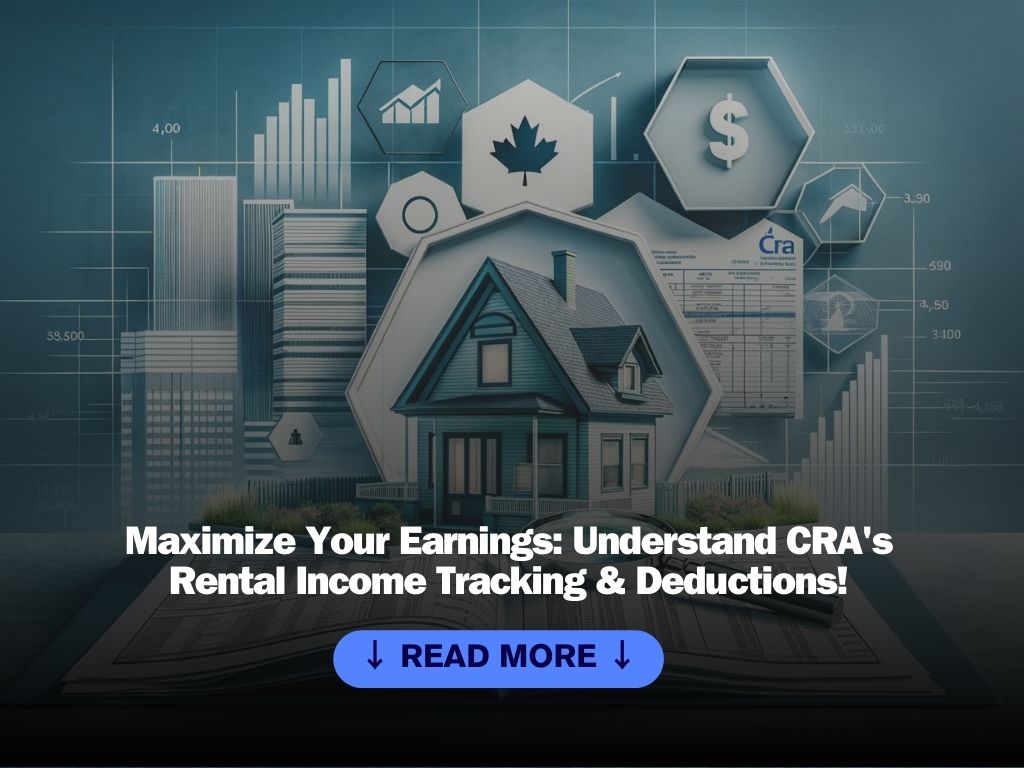Key Takeaways
- Rental income is the money or value you receive for renting out a property that you own, such as a house, apartment, or condo.
- You must report rental income on your tax returns, regardless of the duration or type of rental, such as Airbnb, income suite, or short-term rental.
- The CRA has various methods to track rental income, such as rent credits, property tax rolls, rental statements, audits, and information exchange with other agencies.
- You can deduct certain expenses from your rental income, such as mortgage interest, property taxes, insurance, repairs, and depreciation.
- You can use Form T776, Statement of Real Estate Rentals, to calculate and report your rental income and expenses.

Introduction
Hello, Hustlers! Do you own a property that you rent out to tenants? If so, you may be wondering how the Canada Revenue Agency (CRA) knows about your rental income and how to report it on your tax returns. In this article, we will explain what rental income is, how the CRA tracks it, and what expenses you can deduct from it. We will also provide some tips and resources to help you file your taxes accurately and avoid penalties and interest.
How Much Will the OAS Pension Increase in 2024? The Truth Behind the $619 Rumor What Expenses Can You Deduct from Your Rental Income? (Updated 2024)
What is Rental Income?
The CRA defines rental income as the money or value you receive for renting out a property that you own. This includes income from houses, apartments, condominiums, and other properties. The CRA requires you to report rental income on your tax returns. This applies to renting out a portion of your home or an entire property. Even if you rent out your property for a short time, such as through Airbnb, it is still considered rental income and must be reported.
Rental income includes:
- Amounts paid to cancel a lease
- Advance rent
- Expenses paid by a tenant
- Security deposits (if you keep them)
- Property or services received in lieu of rent
How Does the CRA Track Rental Income?
The CRA obtains information about rental income through various methods, such as:
- Rent credits – Many provinces have rent credits for tenants, which require the tenant to provide details of the property they are renting and the landlord. For example, in Ontario, this is done through the Ontario Energy and Property Tax Credit (OEPTC). In Quebec, it is done through the Solidarity Tax Credit.
- Property tax rolls – If you own multiple properties and therefore have multiple property tax rolls under the same name, the CRA may request you to provide details relating to the use of each property. Abnormalities like very low income but owning multiple properties will get flagged.
- Rental statements – In some cases, individuals may receive rental statements from property management companies or rental platforms, which are reported to the CRA as income, so they are aware there are matching landlords on each of these properties.
- Audits – The CRA conducts random or targeted audits throughout the year. The CRA may review your tax returns, bank statements, rental agreements, and other documents to verify your rental income and expenses.
- Information exchange – The CRA may exchange information with other government agencies, such as land registry offices or municipal authorities, to track rental income and ensure compliance⁸.
What Expenses Can You Deduct from Your Rental Income?
You can deduct certain expenses from your rental income, as long as they are reasonable and related to earning rental income. These expenses include:
- Depreciation – You can claim a portion of the cost of your rental property and its improvements as a capital cost allowance (CCA) each year. This is an allowance for the wear and tear of the property over time. You can use Form T776, Statement of Real Estate Rentals, to calculate and claim CCA.
- Mortgage interest – You can deduct the interest portion of your mortgage payments, as long as the mortgage is used to buy or improve your rental property. You cannot deduct the principal portion of your mortgage payments⁶.
- Property taxes – You can deduct the property taxes you pay on your rental property for the period it is available for rent.
- Insurance – You can deduct the insurance premiums you pay on your rental property for the period it is available for rent.
- Repairs and maintenance – You can deduct the cost of repairs and maintenance that are necessary to keep your rental property in good condition and habitable. You cannot deduct the cost of improvements that increase the value or change the use of the property.
- Other expenses – You can deduct other expenses that are related to earning rental income, such as advertising, utilities, professional fees, management fees, travel, office expenses, salaries, and wages.
You cannot deduct personal expenses, such as mortgage principal, land transfer taxes, homeowner’s association fees, or the value of your own labour.
How to Report Your Rental Income and Expenses?
You can use Form T776, Statement of Real Estate Rentals, to calculate and report your rental income and expenses. You can find this form on the CRA website. You will need to provide the following information on the form:
- Identification – You will need to enter your name, social insurance number, address, and the address of your rental property.
- Details of other co-owners and partners – If you own the rental property with other individuals or as part of a partnership, you will need to enter their names, social insurance numbers, and shares of ownership or partnership.
- Income – You will need to enter the total amount of rental income you received or are entitled to receive for the year. This includes rent payments, security deposits, expenses paid by tenants, and other income related to your rental property.
- Expenses – You will need to enter the total amount of expenses you paid or are entitled to pay for the year. This includes depreciation, mortgage interest, property taxes, insurance, repairs, and other expenses related to your rental property.
- Net income or loss – You will need to subtract your total expenses from your total income to get your net income or loss from your rental property. This amount will be reported on line 12600 of your income tax and benefit return.
Conclusion
Renting out a property can be a great way to earn extra income, but it also comes with tax obligations and responsibilities. You must report your rental income and expenses to the CRA and pay taxes on your net income. You can use Form T776, Statement of Real Estate Rentals, to calculate and report your rental income and expenses. You can also use HustleHub’s online tax software to make the process easier and faster. By following the CRA’s guidelines and keeping accurate records, you can avoid penalties and interest and maximize your tax deductions. Happy renting, Hustlers!


